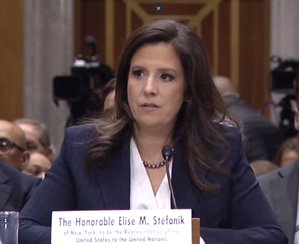
At a hearing on January 22, US Senators and Elise Stefanik, the nominee for US Ambassador to the United Nations, expressed concerns over China’s growing influence at the UN, largely due to its financial leverage and efforts to place its nationals in key positions.
Stefanik, a former Republican Representative and a strong foreign policy advocate, highlighted the deepening influence of the Chinese Communist Party (CCP) within the UN. She stated, “It’s no question that the CCP has made significant inroads,” and emphasized the need for strong American leadership to counter this expansion, particularly among Global South nations in the General Assembly.
The issue of China’s influence came into focus during Stefanik’s Senate Foreign Relations Committee hearing, which was part of the process for her confirmation as Permanent Representative to the UN. The position requires Senate approval.
Stefanik reiterated her commitment to advancing President Trump’s “America First” policy, particularly in terms of reforming the UN. She agreed with Senator Pete Ricketts’ criticism of the UN’s “mismanagement, corruption, and rot,” and said that the US’s 22% contribution to the UN’s budget should be used to demand more reforms and transparency.
The growing concern over China was also underscored by Senator James Risch, who noted that the US was frequently outvoted in the General Assembly. He attributed this to China’s financial strategies, saying, “The Chinese are spreading money and buying votes.” Stefanik suggested that the US needs a broader strategy to engage with the Global South, where China has made significant investments in infrastructure, such as ports and telecommunications, leveraging them for political influence.
Furthermore, the discussion highlighted China’s increasing presence within the UN system, with a reported 85% increase in the number of Chinese nationals holding UN positions from 2009 to 2021. Senator Ricketts warned that these appointments could be advancing China’s interests, regardless of the individuals’ roles.
Stefanik agreed that China’s attempts to dominate key leadership positions within UN agencies required vigilance. She stressed the importance of ensuring that American or allied candidates are actively promoted during elections. She pointed to the 2020 contest for the leadership of the World Intellectual Property Organization, where a Singaporean candidate supported by the US defeated China’s nominee.
While some Senators, such as Democrat Brian Schatz, cautioned against the US withdrawing from UN agencies like the World Health Organization (WHO), arguing that such actions would only empower China, Stefanik remained firm in her stance on reforming the UN and asserting US leadership. She underscored the importance of maintaining US engagement in international forums to ensure China does not dominate them.
Recent Random Post:
















